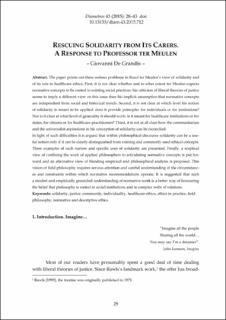| dc.contributor.author | De Grandis, Giovanni | |
| dc.date.accessioned | 2020-04-30T07:47:55Z | |
| dc.date.available | 2020-04-30T07:47:55Z | |
| dc.date.created | 2016-01-14T17:45:54Z | |
| dc.date.issued | 2015 | |
| dc.identifier.citation | Diametros: An Online Journal of Philosophy. 2015, (43), 28-43. | en_US |
| dc.identifier.issn | 1733-5566 | |
| dc.identifier.uri | https://hdl.handle.net/11250/2653010 | |
| dc.description.abstract | The paper points out three serious problems in Ruud ter Meulen’s view of solidarity and of its role in healthcare ethics. First, it is not clear whether and to what extent ter Meulen expects normative concepts to be rooted in existing social practices: his criticism of liberal theories of justice seems to imply a different view on this issue than his implicit assumption that normative concepts are independent from social and historical trends. Second, it is not clear at which level his notion of solidarity is meant to be applied: does it provide principles for individuals or for institutions? Nor is it clear at what level of generality it should work: is it meant for healthcare institutions or for states, for citizens or for healthcare practitioners? Third, it is not at all clear how the communitarian and the universalist aspirations in his conception of solidarity can be reconciled.
In light of such difficulties it is argued that within philosophical discourse solidarity can be a useful notion only if it can be clearly distinguished from existing and commonly used ethical concepts. Three examples of such narrow and specific uses of solidarity are presented. Finally, a sceptical view of confining the work of applied philosophers to articulating normative concepts is put forward and an alternative view of blending empirical and philosophical analysis is proposed. This vision of field philosophy requires serious attention and careful understanding of the circumstances and constraints within which normative recommendations operate. It is suggested that such a modest and empirically grounded understanding of normative work is a better way of honouring the belief that philosophy is rooted in social institutions and in complex webs of relations. | en_US |
| dc.language.iso | eng | en_US |
| dc.publisher | Jagiellonian University Kraków | en_US |
| dc.rights | Navngivelse-Ikkekommersiell 4.0 Internasjonal | * |
| dc.rights.uri | http://creativecommons.org/licenses/by-nc/4.0/deed.no | * |
| dc.title | Rescuing Solidarity from Its Carers. A Response to Professor ter Meulen | en_US |
| dc.type | Peer reviewed | en_US |
| dc.type | Journal article | en_US |
| dc.description.version | publishedVersion | en_US |
| dc.source.pagenumber | 28-43 | en_US |
| dc.source.journal | Diametros: An Online Journal of Philosophy | en_US |
| dc.source.issue | 43 | en_US |
| dc.identifier.doi | 10.13153/diam.43.2015.712 | |
| dc.identifier.cristin | 1313593 | |
| dc.description.localcode | Diametros applies the Creative Commons Attribution (CC-BY-NC) license to works we publish. Under this license, authors agree to make articles legally available for reuse, without permission or fees, for any purpose except commercial. Anyone may read, download, copy, print, distribute or reuse these articles without asking prior permission from the publisher or the author, as long as the author and original source are properly cited. The author holds the copyright without any other restrictions. Full information about CC-BY-NC: https://creativecommons.org/licenses/by-nc/4.0/legalcode. | en_US |
| cristin.ispublished | true | |
| cristin.fulltext | original | |
| cristin.qualitycode | 1 | |

